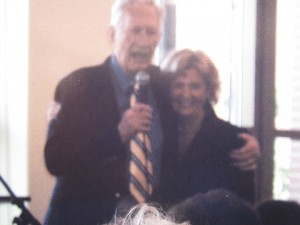 The other day I was running errands and passed a small store that had some big enthusiasm out front. A teen girl dressed warm against the wintry temperatures was holding up a yard-wide poster that said, “CASH FOR GOLD!”
The other day I was running errands and passed a small store that had some big enthusiasm out front. A teen girl dressed warm against the wintry temperatures was holding up a yard-wide poster that said, “CASH FOR GOLD!”
She wasn’t just holding it up. She was waving it back and forth in an effort to get the attention of passing cars. On top of that she was dancing, back and forth, up and down, side to side, spinning around, ear-buds enlivening her ears with upbeat music. Although I’d seen similar signs (which are called human billboards), I’d never seen such a lively one. I wondered if she had just started her shift or if she was just one exceptional employee.
All of us can remember projects or commitments we started with gusto but finished just-barely, if at all. Some were even in the spiritual realm. Who of us hasn’t committed to reading through the Bible in a year, only to get bogged down in Leviticus or Numbers? Maybe we made New Year’s resolutions to eat healthy but gave up in February, or started exercise programs that went defunct 4 weeks in.
What’s the key to following through with the things we say we’re going to do? It’s partly the character quality of perseverance, but absent that, it can also be sharing the same commitment with a like-minded friend, or asking someone else to hold us accountable. Even having an enthusiastic cheerleader on the sidelines is sometimes enough to make us follow through.
Scripture includes a verse that talks about cheerleaders. Hebrews 12:1 mentions “a great cloud of witnesses” watching the life races we’re running as believers in Christ. Scholars dispute who these witnesses are, but it’s clear somebody is watching, and most agree those somebodies are urging us on to do the best we can in this life.
I don’t know exactly who’s in that crowd, but I do know the name of one biblical cheerleader who is steadily encouraging us with gusto, whether standing in that group or off by himself: Jesus Christ. He’s watching us for signs of ever-growing faith in him while simultaneously doing something wonderful. He’s praying we won’t fail, or, put another way, praying we’ll succeed.
When I think of Jesus (and the others), and of having only one earthly lifetime to use for heavenly purposes, it makes me want to keep the commitments I’ve made and to do so with enthusiasm. Although I might not be able to dance while following through, I can certainly leap for joy inside my heart and my will, especially over the things God has directly assigned for me to do.
As for the CASH FOR GOLD girl, I think I’ve seen that same gusto someplace else:
“David was dancing before the Lord with all his might, while he and all Israel were bringing up the ark of the Lord with shouts and the sound of trumpets.” (2 Samuel 6:14-15)




